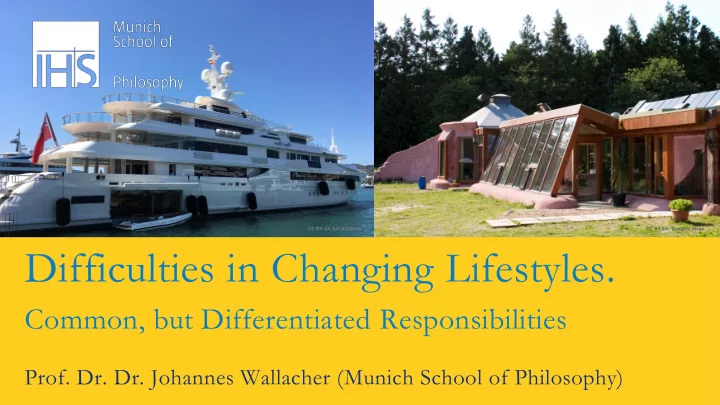

CC BY-SA 4.0, KOOGas CC BY 2.0, Dominic Alves Difficulties in Changing Lifestyles. Common, but Differentiated Responsibilities Prof. Dr. Dr. Johannes Wallacher (Munich School of Philosophy)
Social-Ecological Transformation on Three Levels The necessity to reform political, economical, and legal institutions on a national and an international level: Guiding Principles for transformation ? CC BY-SA 4.0, A. Hellberg Individual- Institutional Ethics Reforms Microscopic Dimension Mesoscopic Dimension Macroscopic Dimension
Social-Ecological Transformation as Guiding Principle Social-ecological modernisation Decoupling development and use of resources by increasing efficiency • Technical innovation and general applications of the innovations • Internalizing costs of using resources/nature (Pricing CO 2 -emissions) Social International embedding coordination Sufficiency Cultural change towards another understanding of well-being, quality of life and development, which is directed towards the global common good
Responsibility of Different „Change Agents “ Individuals: Concepts of a good life which transcend consumerism (“virtue of enough” instead of “insatiable needs”) Sustainable consumption and mobility Nation States/Governments: Abolish various state subsidies for fossil based energy, mobility and consumption Promoting appropriate pricing mechanisms for CO 2 emissions embracing all sectors Investing in sustainable public transport and mobility infrastructure Transparent labelling of origin (including labor conditions) and quality of products
Responsibility of Different Change Agents Business/(Transnational) Corporations: Pioneering in delivering sustainable goods and services (production, pricing, marketing) Co-responsibility for framing/regulating market conditions which promote sustainability Faith-Based Organisations/Churches: Communicate their spiritual traditions and considerations of creation theology as basic stimuli for personal transformation and change of behaviour Engagement as advocates for socio-ecological transformation Credible action in their own sphere of responsibility
Responsibility of different Change Agents Science/reframing economic theory: Questioning the supply-side dominance of neoclassical production theory (assumption of insatiable needs/desires of consumers) Broadening the simple neo-classical concept of human well-being: land, labour and capital → income → goods and services → personal well-being
Alternative Theories (“Narratives”) of P ersonal Well-Being Enhancing “capabilities” (Amartya Sen ) Preference Formation Personal Contexts : Mechanism • Social Institutions history and • Social and legal norms psychology Social Influences on • Other people‘s behavior‘s Decision Making and characteristics • Environmental factors and many, many more Capability Set Non-market production Individual Market production Achieved Goods and Choice Conversion Fundctions Services Capabilities Net income Factors (i.e. opportunity set of Transfers-in-kind achievable functionings) Means to achieve Freedom to achieve Achievement (capability inputs)
Recommend
More recommend